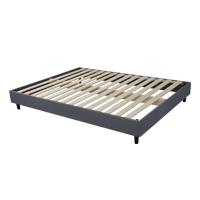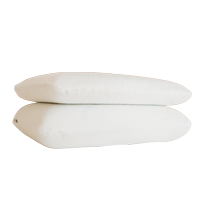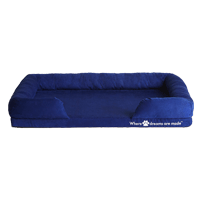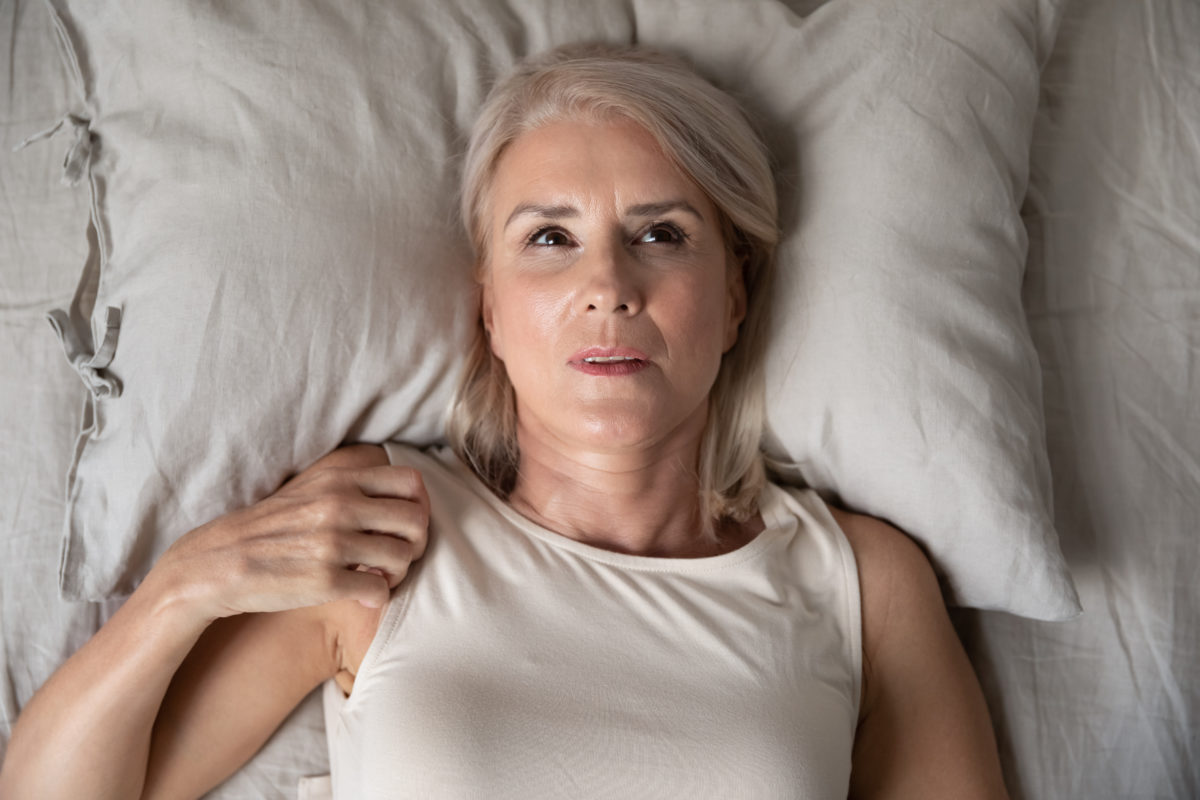Slumber Tips
Your Complete Guide to Sleeping Positions
Side or Starfish? Reduce Back Pain With These Handy Tips
We all know the benefits of getting a good night’s sleep. On average, adults need 7 – 9 hours of sleep a night to maintain a healthy mind and body. But, if you’re getting plenty of shut-eye and still waking with aches and pains, it may be time to reconsider your preferred sleeping position.
Sleep Republic’s medium-firm, hybrid pocket spring mattress offers unrivalled support in a wide range of sizes and is officially endorsed by the Australian Spinal Research Foundation.
Why does sleeping in a bad position cause you back pain?
During the day, most of us are mindful to keep a good posture. We create ergonomically designed workstations to keep our backs straight and reduce pressure on our necks and shoulders. We adjust our car seats to a suitable position to ease the strain from long drives, but what about when we’re sleeping?
While you’re asleep, you may settle into a sleeping position that puts pressure on your hips, shoulders or neck. Your back may also be unsupported or left in a non-neutral position which can exacerbate pressure points or existing back issues. The ideal sleeping position will keep the back in a neutral position and alleviate stress on the neck, shoulders and hips.
What is the healthiest and worst sleeping position?
All sleeping positions have drawbacks and benefits, but some are better for you than others, especially if you suffer from a sore back or aches in your shoulders, neck or hips. Spinal alignment is key.
Let’s break it down:
| Position | Benefits | Disadvantages |
| Back | Gravity helps keep your back aligned and in a relaxed state. This position also protects the spine and relieve hip and knee pain.
Generally causes less spinal pain than the foetal or front sleeping positions. |
May exacerbate existing back troubles and worsen snoring and sleep apnea. |
| Side | Sleeping on your left side may reduce snoring, indigestion and relieve heartburn.
Generally causes less spinal pain than the foetal or front sleeping positions. |
Sleeping on your right side may increase heartburn, acid reflux and pain in the right shoulder.
Sleep exclusively on your left side, and you may experience pain in the left shoulder as well. |
| Foetal | Great for lower back pain and pregnancy and may reduce snoring. | If curled too tightly in this position, deep breathing may be constricted, and joint pain exacerbated. |
| Front/ Stomach | Good for snoring and sleep apnea. | Extends the neck backwards, which compresses the spine.
May lead to chronic neck and back pain if used exclusively. |
What mattress firmness is best for side sleepers?
A mattress with a medium-soft to medium-firm feel is considered the best for side sleepers. Medium-soft and medium-firm mattresses provide sufficient softness to allow the hips and shoulders to be positioned correctly while still giving the proper support to the spine.
Is a hybrid mattress good for side sleepers?
Hybrid mattresses are fantastic for side sleepers. With their combination of gently moulding foam and latex layers and responsive spring coil support, they provide unrivalled comfort and support for those who prefer to sleep on their sides.
The combination of different layer types helps keep your spine, shoulders, and hips in a neutral position. Hybrid mattresses also significantly reduce the pain caused by pressure in the neck, shoulders, knees and hips when a mattress is too firm to allow for proper spinal alignment while sleeping.
Why do my hips hurt when I sleep on my side?
If you’re experiencing aching or sore hips after sleeping on your side, it may be that your mattress is either too soft or too firm. If your mattress is too soft, you risk pushing your spine out of alignment creating pressure points around the base of the spine and hips. Too firm, and the mattress will not easily mould and cradle the hip area and create a curvature of the spine’s position while sleeping, which, in turn, adds pressure to the hips.
Combining the responsive support of coil springs and the soft moulding qualities of foam and natural latex, a hybrid mattress provides exceptional support and all-night comfort to side sleepers.
Is a firm mattress better for your posture?
In the past, people with ongoing back issues would often be encouraged to sleep on a very firm mattress or even with a board under their mattress, but there is little evidence to suggest this is better for your posture. A firmer mattress may help you achieve good spinal alignment while sleeping exclusively on your back; however, if you tend to swap and change positions through the night, you’ll probably find you still wake up sore.
A medium-firm mattress provides back sleepers with all the support they need while also improving spinal alignment when sleeping on your side, the foetal position or on your front. In addition, mattresses with a medium-firm feel will reduce the impact a hard or firmer mattress will have by moulding and gently supporting the hips, neck and shoulder areas.
Can sleeping on a bad mattress cause back pain?
Yes! We spend up to one-third of our lives sleeping, so it’s not altogether surprising that the mattress we use contributes greatly to our quality of sleep and overall health.
Is it better to sleep on a firm or soft mattress?
Unfortunately, there is no right or wrong mattress for back pain and no magical cure to solve it. However, if you’re experiencing ongoing back pain that seems unlikely to be caused by day-to-day activities, you may want to consider replacing your mattress with something firmer. Generally speaking, the experts agree that a firmer mattress is better for bad backs.
What is the best mattress for a stomach sleeper?
If you’re a die-hard stomach sleeper, it can be hard to find other sleeping positions as comfortable. However, sleeping on your stomach can present some problems.
Sleeping on your front can place considerable pressure on your neck and shoulders from the twisted placement of the head in this position. Alternating which side your head is on during the night can help but is difficult to manage. Another idea would be to use a low and soft pillow and sleep with only the head in this position – not the shoulders. Alternatively, simply remove the pillow altogether, which brings the head down to a more neutral position causing less strain in this area.
Why does my back hurt when I sleep on a soft mattress?
Unfortunately, a soft, unsupportive can worsen existing back pain or even be responsible for causing it. That’s because a mattress that doesn’t keep your spine in alignment can contribute to pressure on pressure points.
If you’ve eliminated any activities from your daily life that could be causing your back pain, it may be time to look at your mattress. Experts agree that a firmer mattress provides better support while sleeping, encouraging the back to stay aligned.
What are the advantages of sleeping on a healthy mattress?
Firstly, let’s consider what to look for in a healthy mattress. A healthy mattress will be:
- Produced with non-toxic materials
- Anti-allergen so they won’t irritate sleepers with sensitivities or asthma
- Construction with superior breathability and airflow to help regulate body temperature and prevent the mattress from overheating
- Endorsed by the Spinal Research Foundation, so you know it’s great for backs
- Be made from premium quality materials ensuring lasting performance and a supportive night’s sleep for many years
There are significant benefits to sleeping on a healthy mattress, and if you’re waking sore or believe your mattress could be responsible for a decline in your health, you may want to consider replacing it. A premium quality mattress like Sleep Republic’s hybrid mattress ticks all the boxes and comes with a 12-year warranty. It could be the answer to a healthy night’s sleep.
How do I stop back pain from sleeping?
You can help prevent back pain from sleeping with a few easy steps:
- First, if you usually sleep on your stomach/front, try sleeping on your side with a body pillow. This will take pressure off your shoulders and neck while giving the same familiar feeling of resting on your chest.
- Sleeping on your stomach/front without a pillow may also reduce this pressure as the head will not have to lift and turn as much while sleeping.
- If sleeping in the foetal position, resist the urge to bring up one leg higher as this can lead to soreness from twisting the hips and back.
- Get a pillow with sufficient firmness to support the head and neck in your preferred sleeping position.
- If you think your sleeping position may be the culprit causing your back pain, consider trialling some new positions to test out other options.
- Ensure your mattress is not causing or contributing to your backaches, joint stiffness, or pain. If your mattress is soft or you’ve had it for several years, a new medium-firm, hybrid pocket spring mattress could be just what the doctor (and your physio) ordered.
Sleeping positions can cause aches and pains in the morning, but if you think your mattress could be contributing, it’s time for an upgrade. Discover your preferred position on our award-winning mattress.










